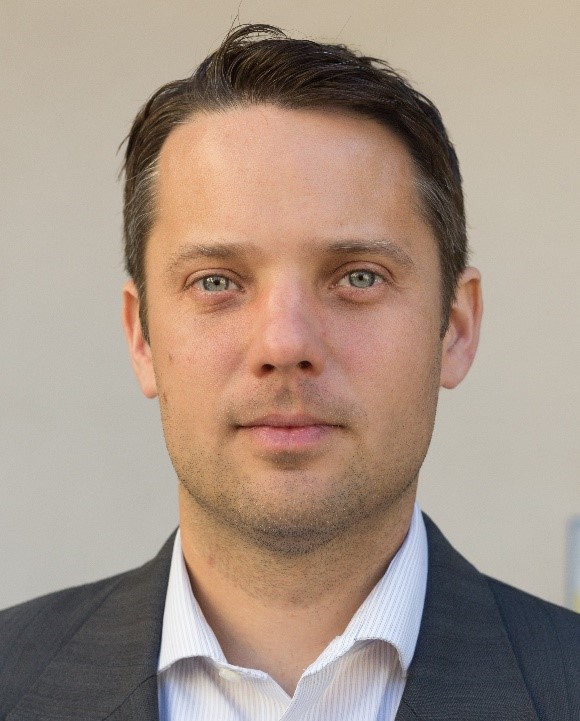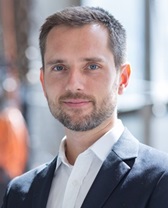Welcome to the Seminar Series in Physical AI
In the seminar on June, 20th, Michael T. Tolley from the University of California gives a talk on "Materials for Biologically Inspired Soft Robots"

Michael T. Tolley
Michael T. Tolley is Associate Professor in Mechanical and Aerospace Engineering, and director of the Bioinspired Robotics and Design Lab at the Jacobs School of Engineering, UC San Diego (bioinspired.eng.ucsd.edu). Before joining the mechanical engineering faculty at UCSD in the fall of 2014, he was a postdoctoral fellow at the Wyss Institute for Biologically Inspired Engineering, Harvard University. He received the Ph.D. and M.S. degrees in mechanical engineering with a minor in computer science from Cornell University in 2009 and 2011, respectively. His research seeks inspiration from nature to design robotic systems with the versatility, resilience, and efficiency of biological organisms. Example topics include soft robots, origami robots, and systems capable of self-assembly. His work has appeared in leading academic journals including Science and Nature, and has been recognized by awards including a US Office of Naval Research Young Investigator Program award and a 3M Non-Tenured Faculty Award.
Abstract talk "Materials for Biologically Inspired Soft Robots"

Prof. Metin Sitti
Metin Sitti is the director of Physical Intelligence Department at Max Planck Institute for Intelligent Systems in Stuttgart, Germany. He is also a professor in D-ITET at ETH Zurich. He was a professor at Carnegie Mellon University (2002-2014) and a research scientist at UC Berkeley (1999-2002) in USA. He received BSc and MSc degrees (1994) from Boğaziçi University, Turkey, and PhD degree from University of Tokyo, Japan (1999). His research interests include physical intelligence, small-scale mobile robotics, bio-inspiration, new robotic materials, and untethered soft medical devices. He founded nanoGriptech Inc. to commercialize his lab’s gecko-inspired microfiber adhesive Setex® technology. He is an IEEE Fellow. As selected awards, he received the Breakthrough of the Year Award in the Falling Walls World Science Summit 2020, ERC Advanced Grant in 2019, Rahmi Koç Science Prize in 2018, SPIE Nanoengineering Pioneer Award in 2011, and NSF CAREER Award in 2005. He received many best paper and video awards in major conferences, including the Best Paper Award in the Robotics Science & Systems Conference in 2019. He is the editor-in-chief of Progress in Biomedical Engineering and Journal of Micro-Bio Robotics and associate editor in Science Advances and Extreme Mechanics Letters journals.

Untethered small-scale mobile robots have the potential to revolutionize healthcare, since they have the unique capability of accessing, operating and possibly staying inside hard and currently not possible to reach small spaces inside the human body non-invasively. On the other hand, soft-bodied robots have unique capabilities with compared to their fully rigid counterparts, such as shape changing and programming, physical adaptation, safe operation, and multifunctionality. Using such unique capabilities of soft robots for medical applications, we propose new miniature soft medical robots that are actuated using external magnetic fields. We first developed a shape-programming methodology for 2D magneto-elastic materials, and used such materials to create magnetic soft millirobots inspired by soft-bodied organisms, such as spermatozoids, caterpillars, and jellyfishes. A magneto-elastic sheet-shaped soft robot is demonstrated to be able to have seven or more locomotion modalities to be able to navigate in complex environments, such as inside the human body. Next, a baby jellyfish-inspired magneto-elastic milliswimmer is shown to realize multiple functionalities by producing diverse controlled fluidic flows around its body. Then, an array of cilia-inspired magneto-elastic cilia is developed to generate metachronal waves for efficient biofluid pumping and fluidic object manipulation. Also, various 3D metastructures-based soft robots with specific medical functionalities are introduced under ultrasound type of medical imaging modalities. Finally, liquid crystal elastomer type of stimuli-responsive materials are integrated with magneto-elastic composites towards self-sensing and self-adapting physically intelligent robots at the small scale.
----------------------------------------------------------------------------------------------------------------------
Previous seminars:
Speaker |
Affiliation |
Topic |
|
Prof. Salvador Pané i Vidal |
Institute of Robotics and Intelligent Systems, ETH-Zürich |
Materials for Small-Scale Robots |
|
Prof. Bram Vanderborght |
Vrije Universiteit Brussel |
Soft Materials for Human-Robot Interaction |
|
Dr. Joost Brancart |
Vrije Universiteit Brussel |
Stimuli-responsive Materials for Self-Healing Applications |
| Dr. Aslan Miriyev | Columbia University in the City of New York | Materials for Soft Robotics |

Metin Sitti is the director of Physical Intelligence Department at Max Planck Institute for Intelligent Systems in Stuttgart, Germany. He is also a professor in D-ITET at ETH Zurich. He was a professor at Carnegie Mellon University (2002-2014) and a research scientist at UC Berkeley (1999-2002) in USA. He received BSc and MSc degrees (1994) from Boğaziçi University, Turkey, and PhD degree from University of Tokyo, Japan (1999). His research interests include physical intelligence, small-scale mobile robotics, bio-inspiration, new robotic materials, and untethered soft medical devices. He founded nanoGriptech Inc. to commercialize his lab’s gecko-inspired microfiber adhesive Setex® technology. He is an IEEE Fellow. As selected awards, he received the Breakthrough of the Year Award in the Falling Walls World Science Summit 2020, ERC Advanced Grant in 2019, Rahmi Koç Science Prize in 2018, SPIE Nanoengineering Pioneer Award in 2011, and NSF CAREER Award in 2005. He received many best paper and video awards in major conferences, including the Best Paper Award in the Robotics Science & Systems Conference in 2019. He is the editor-in-chief of Progress in Biomedical Engineering and Journal of Micro-Bio Robotics and associate editor in Science Advances and Extreme Mechanics Letters journals.


